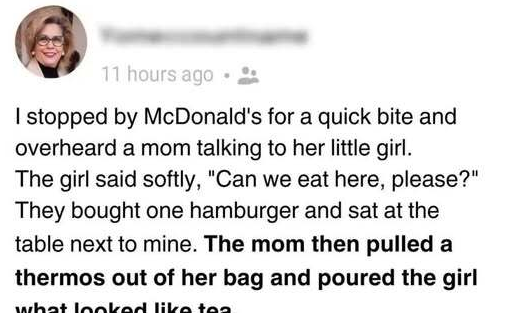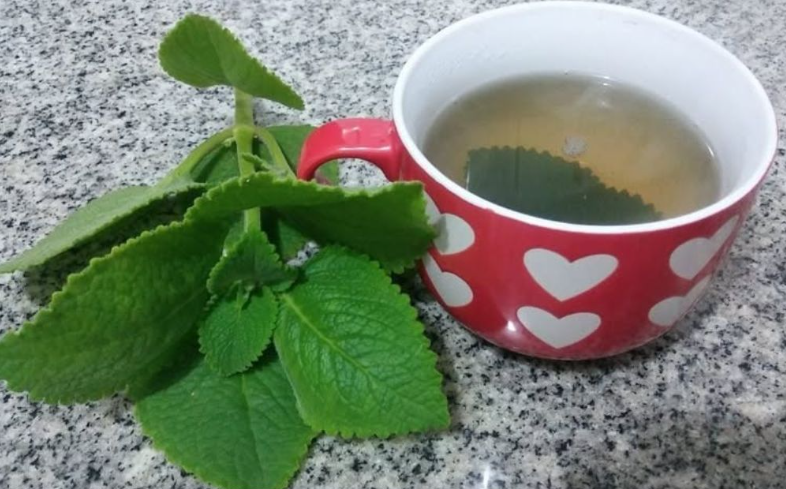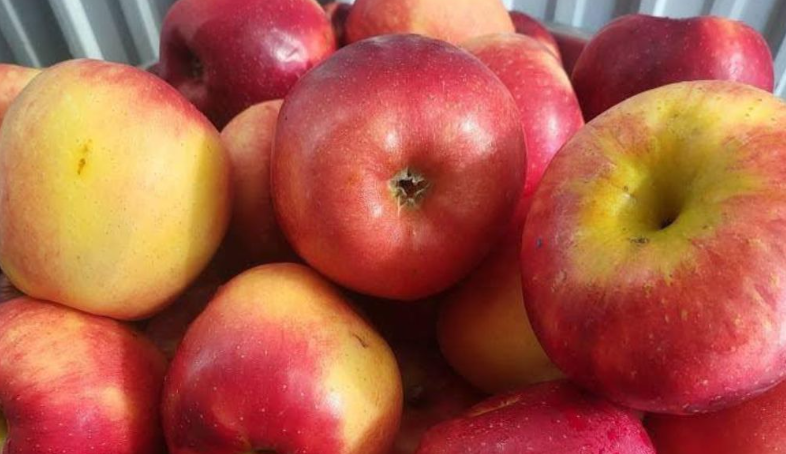It was a typical afternoon, the sort where daily routines unfold without much notice. I decided to pause at a McDonald’s for a brief meal amid my various tasks, intending to dine quietly while scrolling through my device. Yet the instant I settled into my seat, a gentle, eager voice drew my focus. At the adjacent table, a young girl gazed upward at her mother, inquiring timidly, “Mom, can we eat here, please?” Her mother beamed, gave a nod, and requested a single hamburger. As they took their places, she meticulously divided the burger into two portions and filled a cup for her daughter from an old thermos. A subtle warmth radiated from the manner in which the woman observed her child savoring every morsel — as though this modest meal carried significance far beyond the items on the tray.
Fragments of their dialogue floated toward me in soft waves. They had arrived straight from a medical visit, and the mother possessed merely enough funds remaining for the return bus fare. She opted to allocate a portion of those coins toward one hamburger since her daughter had long cherished the idea of experiencing McDonald’s one time. The child’s delight proved infectious — she consumed her share deliberately, grinning with each mouthful, approaching every nibble as if it marked a festive event. Her mother refrained from eating; she merely observed with a serene, fulfilled look that conveyed weariness, affection, and unspoken devotion.
I completed my own food, yet my thoughts lingered on them. The mother sought no assistance; she cast no glances seeking aid. She focused entirely on brightening her daughter’s day using the resources at hand. Acting on a sudden urge, I returned to the counter and purchased a Happy Meal, complete with a toy and an extra portion to spark joy. I placed it on their table while walking by, said softly, “For her,” and proceeded to the exit before any reply came. From behind, the girl’s voice rang out: “Mommy, look! He gave us another one!” The mother met my gaze briefly to murmur, “Thank you,” and within her expression lay an image etched in my memory — a blend of appreciation and ease from knowing her efforts had been noticed.
Emerging into the bright daylight, I understood that acts of kindness require no fanfare or dramatic shifts. Often they appear as subtle exchanges among unfamiliar faces — one individual’s modest action aligning with another’s profound care. That day, within the hustle of a popular fast-food spot, I witnessed the essence of giving. It served as a reminder that positive forces in life stem not from monumental deeds, but from individuals who continue to show concern through the tiniest expressions.
Reflecting deeper on that encounter, I pondered how everyday settings like a McDonald’s can become stages for meaningful human connections. The restaurant buzzed with the usual sounds: orders being called, trays clattering, and families chatting. Amid this ordinary backdrop, the mother and daughter created a pocket of intimacy.
The girl’s eyes widened at the golden arches outside, a symbol she had likely seen in advertisements or heard about from friends. For her, stepping inside represented an adventure, a break from routine challenges. Her mother, aware of their tight circumstances, transformed limited means into a memorable outing. She unwrapped the burger with care, ensuring the lettuce and sauce distributed evenly between the halves. Pouring the drink from the thermos — perhaps filled with water or a homemade beverage — added a personal touch, making the meal feel complete despite its simplicity.
The little girl’s reactions painted a picture of pure wonder. She lifted her half carefully, examining the sesame seeds on the bun as if discovering treasure. Each bite elicited a small sound of approval, and she paused between them to describe the flavors to her mother. “It’s warm and yummy,” she might have said, her voice carrying innocence that cut through the ambient noise. Her mother nodded encouragingly, her own hunger set aside in favor of this shared happiness. This dynamic highlighted the depths of parental love, where personal needs fade to prioritize a child’s dreams, no matter how small.
My decision to intervene stemmed from an internal pull, a recognition of their quiet struggle. Standing at the counter again, I scanned the menu board illuminated with colorful images of meals and toys. The Happy Meal options included choices like chicken nuggets or a cheeseburger, accompanied by fries, apple slices, and a drink. Selecting one with a popular toy — perhaps a figurine from a current children’s movie — felt right, as it promised additional excitement. Paying quickly, I carried the bright box back, noting the vibrant packaging designed to appeal to young ones. Placing it down, I avoided lingering to preserve the anonymity of the gesture, allowing the surprise to unfold naturally.
The girl’s exclamation echoed with unfiltered glee, prompting her mother to look up in astonishment. That whispered “Thank you” carried layers of emotion: surprise at the unexpected help, gratitude for the relief it provided, and perhaps a spark of hope renewed. In her eyes, fatigue from the hospital visit mingled with joy, creating a poignant moment. Hospitals often involve waiting rooms, examinations, and uncertainties, especially for families managing on limited budgets. The appointment could have been a routine check-up or something more pressing, but it left them with scant resources for the journey home. Choosing the hamburger over saving every coin demonstrated her commitment to normalcy and joy amid adversity.
Walking out, the sun warmed my face, and the parking lot hummed with cars coming and going. People hurried in for quick bites, others lingered over coffee. Yet that brief interaction shifted my perspective on the day. Kindness, I realized, thrives in these unassuming spaces. It bridges gaps between strangers without requiring names or backstories. The mother’s sacrifice and the child’s delight formed a narrative of resilience, one that inspires without words.
Expanding on this, consider how such stories resonate broadly. In a world filled with headlines of grand philanthropy — donations to causes, viral fundraisers — the understated acts often hold equal power. A shared meal in a fast-food chain becomes a lesson in empathy. Parents everywhere navigate similar choices: balancing budgets while nurturing dreams. The thermos, worn from use, symbolized resourcefulness, a tool for stretching provisions. The divided burger represented equity, ensuring the child felt fullness and inclusion.
The toy in the Happy Meal added another layer. Toys spark imagination, offering escapism. For this girl, it might become a cherished item, a reminder of the day her wish came true twofold. Her mother, seeing the extra food, could partake without guilt, knowing her daughter’s portion remained intact. This ripple effect multiplies the impact of one action.
Personally, the experience lingered through the afternoon. Running subsequent errands — picking up groceries, mailing a package — my mind replayed the scene. It prompted thoughts on my own privileges: the ease of affording a meal without calculation, the freedom to impulsively help. Gratitude welled up, not for material things, but for the opportunity to contribute positively.
Broader implications emerge when viewing this through a societal lens. Fast-food restaurants serve diverse crowds, from busy professionals to families on tight schedules. They democratize dining, making treats accessible. Yet beneath the surface, stories like this reveal inequalities. The mother’s choice to spend on the hamburger prioritized emotional well-being over strict frugality, a wise decision for mental health.
Encouraging such gestures benefits communities. Imagine more people noticing and acting on similar moments. A chain reaction of positivity could enhance daily interactions. Restaurants might even foster this through subtle programs, though individual initiative drives the core change.
In conclusion, that afternoon at McDonald’s illuminated generosity’s true form. It flows from observing, empathizing, and responding with heart. The mother’s love, the daughter’s joy, and my small contribution wove a tapestry of human goodness. Such instances remind us to stay attentive, ready to extend care in modest yet profound ways. Life’s beauty often hides in these fleeting, heartfelt exchanges, enriching all involved.







